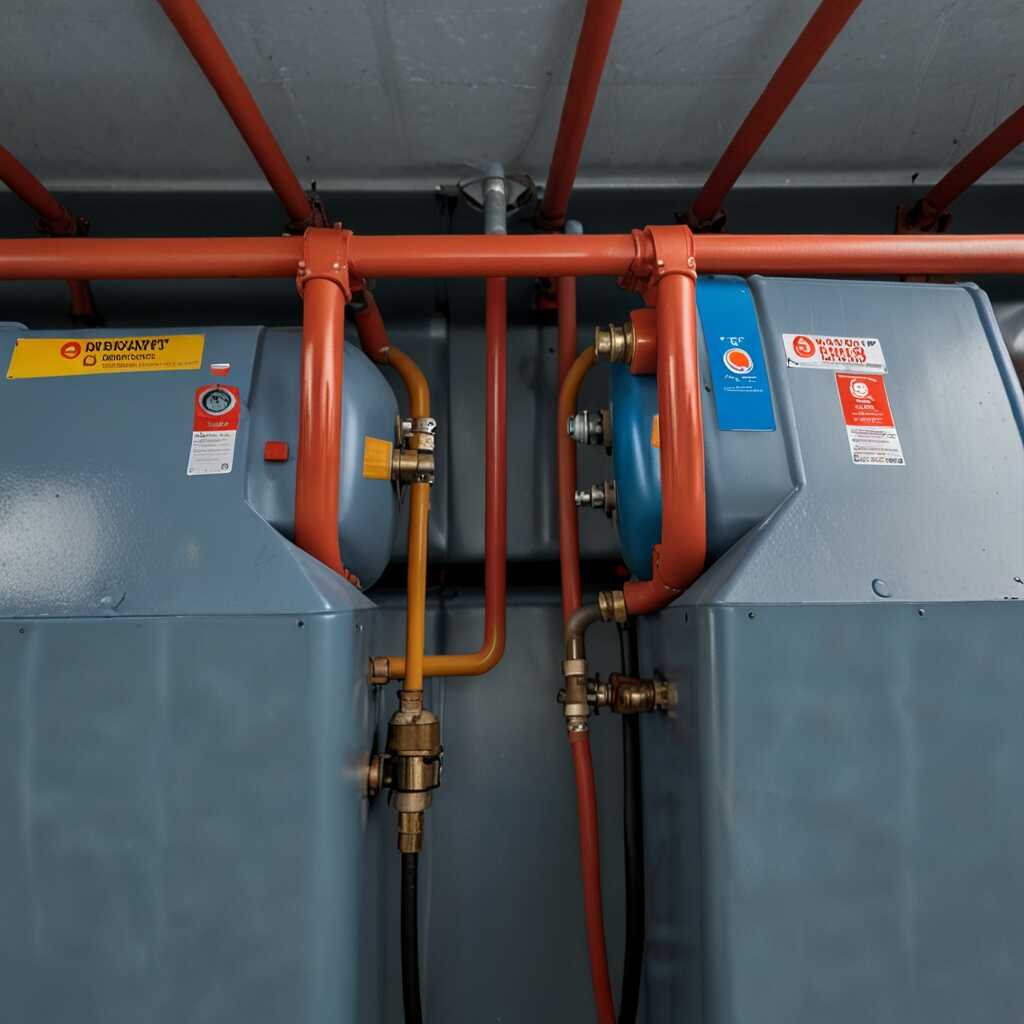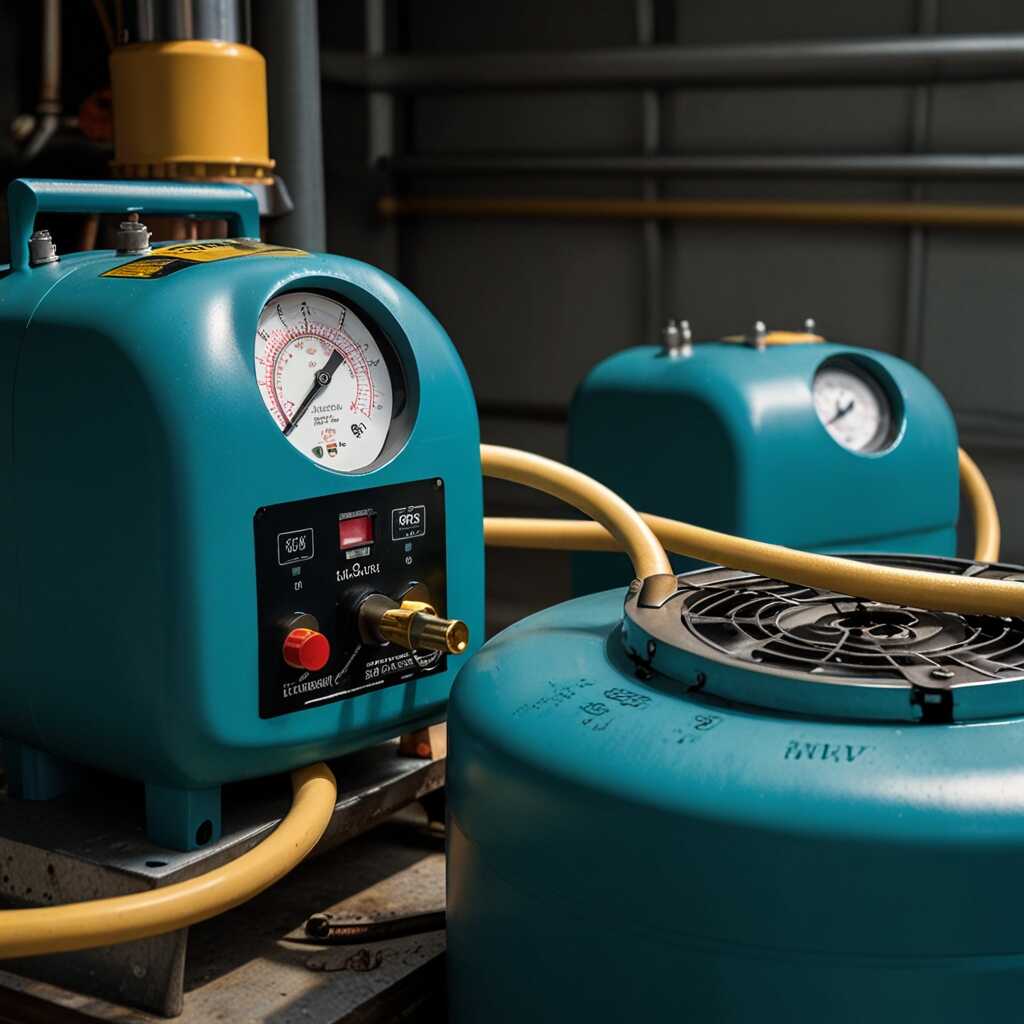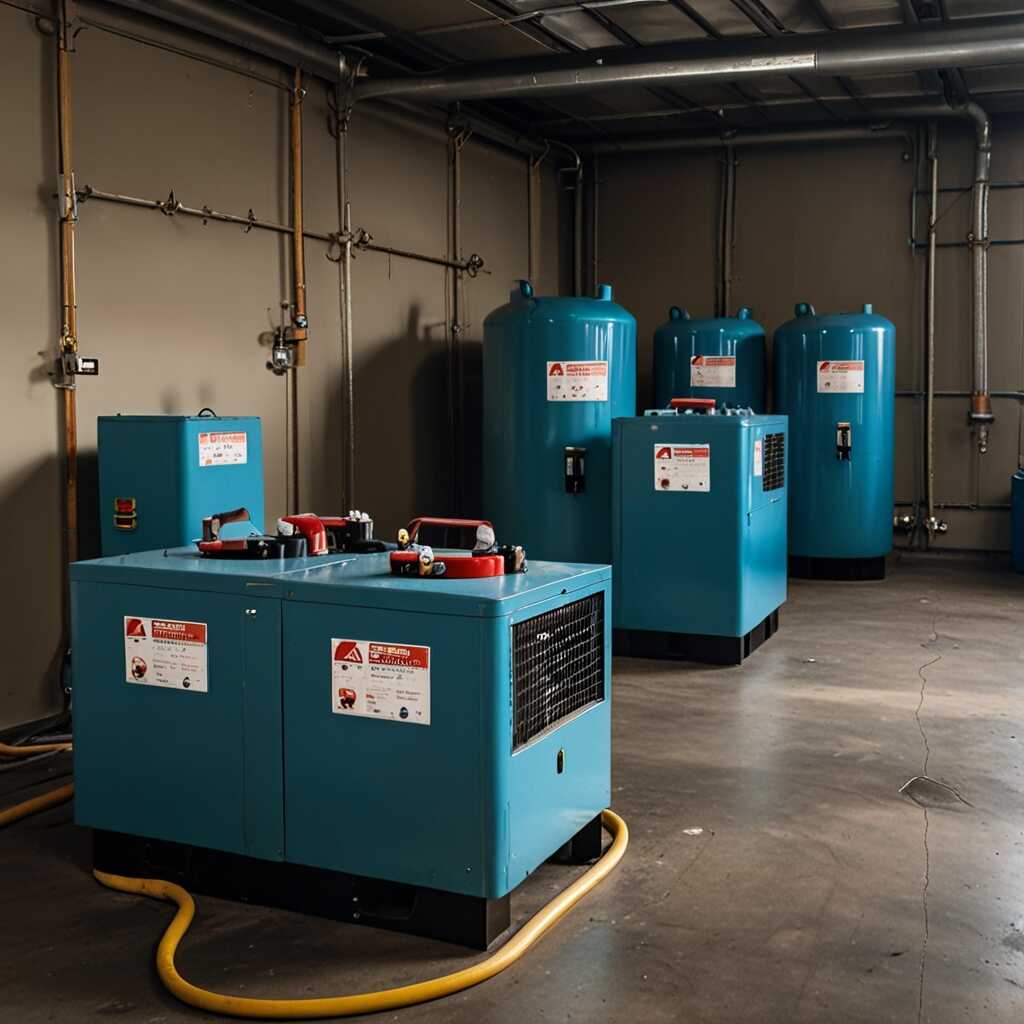Discover the numerous benefits of refrigerant recovery systems with integrated scales, which enhance accuracy during refrigerant filling. These systems streamline the recovery process, ensuring compliance with environmental regulations and reducing waste. Refrigerant Recovery Pro offers expert guidance on selecting and using these systems effectively. HVAC technicians and contractors can benefit from technical support and best practices tailored to improve refrigerant management.
Fundamentals of Refrigerant Recovery Systems in HVAC
Refrigerant recovery systems are essential tools used in HVAC operations to recover refrigerants from systems during maintenance or servicing. These systems function by safely extracting refrigerants from equipment and storing them for reuse or proper disposal. The critical role of these systems includes preventing refrigerant leaks, which can harm the environment, ensuring compliance with regulations, and maintaining system efficiency. An integrated scale enhances the accuracy of refrigerant filling by weighing the amount of refrigerant during recovery, ensuring precise administration according to specifications. This integration allows HVAC professionals to achieve optimal performance in HVAC systems, enhancing their reliability and efficiency.
Key Components of Refrigerant Recovery Systems
The key components of refrigerant recovery systems include compressors, storage tanks, hoses, and integrated scales. Compressors allow for the efficient extraction of refrigerants, while storage tanks securely hold the recovered substances. Hoses connect the system for effective transfer between the units. Integrated scale technology is particularly important as it enables precise filling and minimizes waste during refrigerant management. This technology enhances the reliability of the recovery process and helps ensure that technicians maintain compliance with environmental regulations. These components work together to provide HVAC professionals with effective tools for refrigerant management.
How Integrated Scales Enhance Refrigerant Recovery Efficiency
Integrated scales significantly improve the accuracy of refrigerant recovery systems, ensuring precise filling. Accurate measurements prevent overfilling or underfilling, which can lead to waste and increased environmental impacts. This reliability enhances compliance with environmental standards, reducing the risk of fines or violations. Systems with integrated scales are versatile and can effectively manage various refrigerants, including R-22, R-410A, and R-134A. By implementing these advanced systems, HVAC professionals can increase refrigerant recovery efficiency, potentially improving it by as much as 30% compared to traditional methods.
Key Benefits of Accurate Refrigerant Management
Accurate refrigerant management is essential for HVAC technicians and commercial contractors. With integrated scales, technicians can easily monitor the refrigerant volume, ensuring proper handling and disposal practices. These systems are designed to enhance efficiency and reliability in various tasks, including system charging and recovery. Furthermore, using integrated scales helps in maintaining compliance with EPA regulations, which is crucial for maintaining industry standards. Regular testing and quality reviews of these systems can also lead to sustained improvements in performance and environmental impact.

Benefits of Accurate Filling for HVAC Performance and Longevity
Accurate refrigerant filling significantly enhances HVAC system performance. Properly charging refrigerants leads to optimal cooling efficiency, reducing energy consumption and ensuring reliable operation. Systems that are accurately charged can last longer due to reduced stress on components. This helps in avoiding premature failures and expensive repairs. Various refrigeration units, such as commercial chillers and residential air conditioners, experience improved cooling output when the right amount of refrigerant is used. Studies have shown that proper refrigerant management can improve energy efficiency by as much as 15%. These advantages prove essential for HVAC professionals aiming for reliable performance and system longevity.
Impact of Accurate Filling on System Efficiency
Accurate refrigerant filling directly influences the overall efficiency of HVAC systems. When systems are charged correctly, they operate closer to their designed specifications. This accuracy ensures that the compressor and other components work optimally, greatly enhancing energy efficiency. For instance, a 2-ton air conditioning unit, when charged with the recommended refrigerant volume, can deliver 20% more cooling output. This reliable performance translates to lower electricity bills and prolonged equipment life. Services provided by Refrigerant Recovery Pro can help HVAC technicians achieve optimal refrigerant management, ensuring that each job meets industry standards and enhances client satisfaction.
Key Numerical Insights on Efficient Recovery Systems
- Integrated scales can increase accuracy to within 0.1%.
- Refrigerant recovery systems can recover up to 95% of refrigerants.
- Using scales can reduce refrigerant loss by 30% or more.
- Some systems allow recovery at rates exceeding 12 lbs. per minute.
- Regular use of scales can lead to an average savings of $500 annually.
- Integrated systems can decrease filling time by up to 50%.
- Compliance with EPA regulations can significantly reduce penalties, often exceeding $10,000.

Challenges Faced in Refrigerant Recovery Without Integrated Scales
HVAC professionals experience several challenges when operating refrigerant recovery systems lacking integrated scales. One major issue is the risk of inaccurate refrigerant measurements, leading to potential overfilling or underfilling. This directly affects system efficiency and can cause operational problems. Additionally, without integrated scales, technicians may struggle to ensure compliance with environmental regulations, risking financial penalties and reputational damage. Another common challenge is the increased time required for refrigerant recovery procedures, as technicians must manually estimate weights, leading to potential delays in service. Proper equipment setup becomes crucial for reliability and efficiency in the HVAC industry.
Impact of Inaccurate Measurements on Refrigerant Recovery
Inaccurate measurements significantly affect refrigerant recovery processes in HVAC systems. HVAC technicians often face difficulties determining the exact amount of refrigerant remaining, which can lead to an increase in refrigerant loss percentages. Research indicates that improper filling without integrated scales can cause refrigerant losses of up to 30%. These losses result in higher operational costs and potential non-compliance with EPA regulations. Integrated scales enhance the reliability of refrigerant measurements, ensuring accurate filling. This functionality improves overall efficiency in various HVAC applications, leading to better performance and reliability standards. Utilizing advanced technology, like integrated scales, supports HVAC professionals in optimizing procedures.

Guidelines for Effectively Utilizing Integrated Scales
Using integrated scales with refrigerant recovery systems provides multiple benefits. They ensure accurate filling, enhancing efficiency and reliability. Accurate measurements reduce refrigerant waste and help maintain compliance with environmental regulations. HVAC technicians can implement best practices to maintain compliance while using these scales. This includes regular testing and calibration. Most integrated scales in the industry typically handle weights up to 110 pounds, accommodating various refrigerant types comfortably. By choosing a scale with adequate capacity, technicians improve the operational reliability of their refrigerant recovery systems.
Best Practices for Calibration and Maintenance of Integrated Scales
Calibration and maintenance of integrated scales are essential for optimal performance in refrigerant recovery. Regular testing ensures that the scale delivers accurate readings. Technicians should follow the manufacturer’s recommendations for calibration frequency, typically every six months. Cleaning the scale and ensuring it remains free of debris enhances its performance. Additionally, using level scales on a flat surface helps maintain accuracy. Employing these best practices ensures compliance with environmental regulations while providing reliable weight measurements during refrigerant recovery processes.
Advantages of Advanced Filling Systems
- Accurate measurements ensure precise refrigerant fills.
- Integrated scales help maintain compliance with HVAC regulations.
- Using these systems minimizes refrigerant waste during servicing.
- Technicians save time, leading to more efficient work schedules.
- Improved safety reduces risks of overfilling and leaks.
- Users report better job satisfaction due to increased operational efficiency.
- Enhanced tracking of refrigerant usage promotes responsible management practices.

Essential Features of Quality Refrigerant Recovery Systems
When selecting refrigerant recovery systems with integrated scales, consider features like reliability, efficiency, and durability. Look for systems designed for accuracy during filling. Integrated scales should provide precise measurements to enhance refrigerant management. Familiarity with brands and their performance is essential. This helps HVAC professionals choose reliable systems that meet their operational needs. Systems should ideally handle diverse refrigerant types, offering compatibility and versatility across various applications.
Key Performance Indicators of Integrated Scale Systems
Key performance indicators for refrigerant recovery systems with integrated scales include weight capacity, speed of recovery, and accuracy levels. An optimal weight capacity is typically around 110 pounds, which supports a broad range of refrigerants. Accurate scales ensure that technicians can fill systems without overcharging or undercharging. Additionally, systems with a fast recovery rate can significantly reduce downtime, improving overall job efficiency. These indicators highlight the system’s ability to function reliably in demanding environments.
Comparative Review of Recovery Systems
Recovery systems with integrated scales show significant advantages over those without. Their efficiency improves due to accurate refrigerant filling, which reduces waste and compliance issues. Integrated scales help professionals know exactly how much refrigerant they handle, ensuring that systems operate under optimal conditions. Reliability and performance are enhanced through precise measuring and monitoring capabilities. Users report an annual saving potential exceeding 15% by adopting scales into their processes, leading to lower operational costs and increased efficiency.
Key Features Enhancing Reliability of Integrated Scale Systems
Recovery systems equipped with integrated scales provide crucial features that improve performance and reliability. These systems ensure precise measurement of refrigerant, eliminating human error associated with manual gauging. Integrated scales display real-time data, allowing technicians to monitor fill levels continuously. This promotes compliance with environmental regulations and enhances the overall efficiency of refrigerant management systems. The use of advanced technology in these scales also minimizes downtime during refilling, making the process faster and more productive. In contrast, systems without scales often suffer from guesswork and imprecision, leading to wastage and inefficiencies. Investing in integrated scales pays off in the long run through better management and reduced costs.
Target Audience for Refrigerant Recovery Solutions
- HVAC technicians benefit from improved job accuracy and efficiency.
- Engineers can achieve better design outcomes with precise removal methods.
- Commercial contractors enjoy reduced operational costs and improved service.
- Environmental officers gain from enhanced compliance with regulations.
- Service managers appreciate the streamlined workflows and cost savings.
- Facilities managers often seek these systems for sustainability efforts.
- Technicians looking for technical support find valuable resources online.
Important Regulations Impacting Refrigerant Management Practices
HVAC professionals must comply with several key regulations, including the EPA 608 Rule, which mandates handling and disposal of refrigerants. Integrated scales help by providing accurate measurements, ensuring compliance with these standards. Under EPA regulations, over 20 different refrigerants are classified, including HFCs and CFCs. Integrated scales enhance performance during refrigerant recovery procedures, enabling compliance with environmental standards.
Understanding EPA Regulations for Refrigerant Management
EPA regulations outline specific guidelines for refrigerant management, focusing on the safe recovery and disposal of refrigerants. HVAC professionals must ensure that all recovered refrigerants are logged and managed correctly to prevent environmental harm. Integrated scales provide accurate readings during recovery, offering reliable data to support compliance efforts. Following these guidelines not only fulfills legal obligations but also promotes sustainability in the HVAC industry. Training on these regulations can enhance technician efficiency and improve overall performance in refrigerant handling.